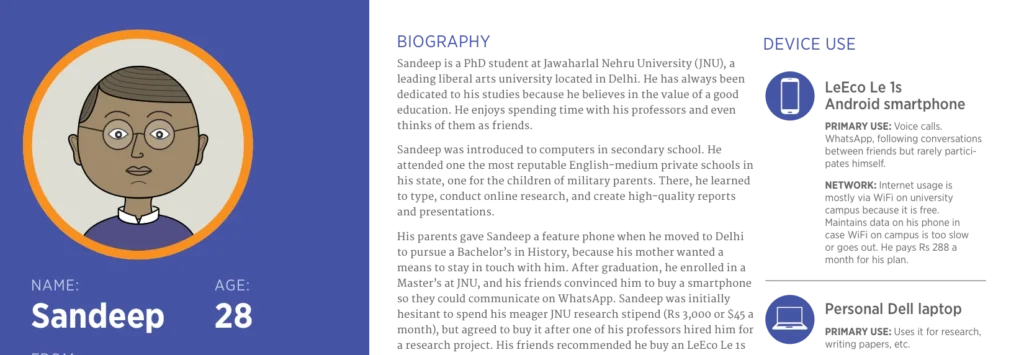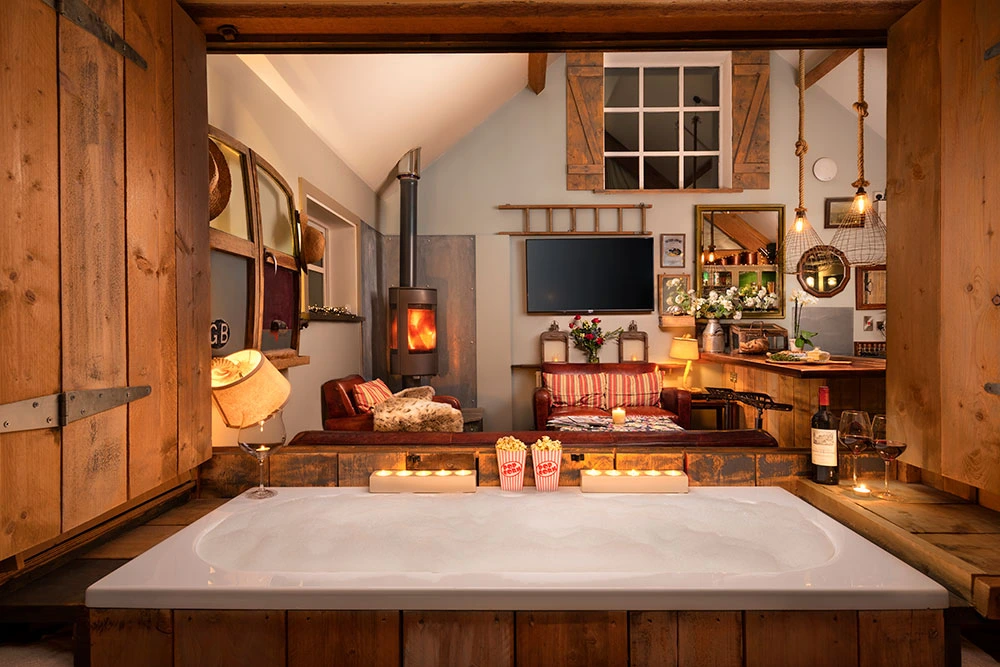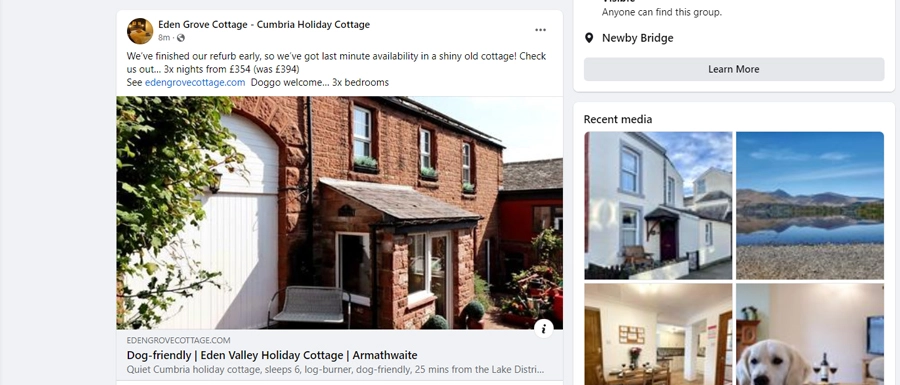If you’re looking to increase direct bookings for your holiday rental, you’ll know there’s no shortage of advice out there. But rather than overwhelm you with every possible marketing tactic, this article focuses on the key components we’ve found to make the biggest difference.
These aren’t theories — they’re practical, proven tactics that we’ve seen work time and time again across the properties we’ve worked with. Whether you’re just starting out or looking to optimise an existing setup, the following points are where we believe your attention is best spent if you want to see real results.
1. Know Your Target Audience

It’s tempting to market your holiday rental to “everyone” — but in our experience, the more specific your audience, the better your results. Tailoring both your property and marketing to a defined group will lead to significantly higher enquiry and booking rates, as well as a much stronger return on your marketing spend.
Start by creating guest personas — fictional profiles based on the interests, preferences, and needs of your ideal customers. These are typically one-page summaries that help you spot what matters most to your audience.
For example, if you’re targeting large families, you might highlight features like a kids’ playroom or include messaging such as “Perfect for Large Families” in your ads. These small touches can make a big impact when appealing to the right guests.
2. Establish a Brand
Branding isn’t just for big companies — it’s essential for holiday rental owners too. A consistent, recognisable brand builds trust, and trust leads to more direct bookings, referrals, and repeat guests. In fact, 81% of consumers say brand trust is a deciding factor when making a purchase (Edelman Trust Barometer).
Your brand is how people perceive your business. It includes your logo, colour palette, fonts, tone of voice, and the style of your photos and messaging.
If budget allows, consider hiring a professional brand designer — it’s a smart investment that pays off over time. For those working with a tighter budget, AI-powered design tools now make it easier than ever to create a cohesive brand identity on your own.
Just make sure your branding is consistent across all platforms — from your website and social media to guest welcome packs and email footers. Consistency builds credibility, and credibility builds bookings.
3. Market To Special Interests
At Smooth Rentals, we’ve seen time and again that marketing towards special interests delivers far better results. Whether it’s accommodation for hobbyist groups, large gatherings, or proximity to popular hiking trails or attractions, targeted campaigns consistently generate up to 4x more enquiries and bookings than broad, generic tourism ads.
This approach is especially valuable if you’re working with a limited budget — niche audiences are often less competitive to target and more likely to convert.
Start by researching what your potential guests are interested in. Then either tailor your marketing to align with those interests, or adapt your property and offerings to meet them.
It’s a smarter route to more direct bookings.
4. Establish Your Value Proposition & USP
Knowing what makes your property valuable is key to attracting the right guests. Your value propositions are the features or benefits that appeal to potential guests — whether it’s affordability, location, a hot tub, or family-friendly facilities. These are the angles you’ll lean on in your advertising.
But value alone isn’t always enough. If your competitors offer the same features, it’s time to dig deeper and find your Unique Selling Proposition (USP) — the thing that sets your property apart.
Maybe you’re the only one in the area with an outdoor cinema setup. Perhaps your cottage is the only riverside rental within walking distance of the local pub. Or maybe you’re the first in your region to offer a fully off-grid eco stay.
Some holiday rentals already have a USP and just need to shout louder about it. Others might need to get creative. Either way, defining what makes you truly different gives people a reason to book with you over anyone else.
5. Use Quality Photos of Your Property

Photos are one of the most important factors when it comes to securing direct bookings. In fact, properties with images are 225% more likely to receive a booking compared to listings without any photos. Photos let guests visualise where they’ll be staying — which helps build trust and creates desire.
If budget allows, we strongly recommend hiring a professional holiday rental photographer. A single booking can often cover the cost, and the images can be reused across your website, social media, email campaigns, and listing platforms.
Professional photos highlight your space in the best possible light and help your property stand out in a crowded market.
6. Focus On Website User Experience (UX)
You have just a few seconds to make an impression when a guest lands on your website. If your page is slow to load, hard to navigate, or feels insecure — they’ll leave. Did you know, that 88% of online consumers are less likely to return to a website after a bad experience, according to UX studies.
A smooth, well-designed website builds trust and helps convert visits into bookings. Prioritise fast loading speeds, clean layouts, and content that’s easy to scan. Make key information — like amenities, availability, and how to book — easy to find.
One important tip: be cautious with PMS free website builders. Many of the free options offered by PMS platforms are quite restrictive in terms of design, content flexibility, and SEO. This can limit your ability to generate traffic and deliver the kind of user experience that converts visitors into bookings.
7. Easy Direct Booking Experience
A smooth booking process is crucial for converting website visitors into guests. In fact, up to 70% of users abandon bookings due to complicated or lengthy checkout processes, according to report by Baymard Institute. Reducing friction and making the booking experience simple and secure keeps users engaged and increases your chances of getting confirmed reservations.
Make sure your booking flow is clear, fast, and builds trust — including visible security badges and clear payment information.
For WordPress users, we recommend plugins like WP Booking System. This keeps the entire process on your site, avoiding redirects to third-party platforms that can feel cluttered or untrustworthy and dilute your brand. Staying on your website throughout the booking builds confidence and encourages completion.
8. Join Facebook Forums

Look for local Facebook groups focused on tourism in your area by searching terms like “tourism [location]” or “visiting [location]”. These forums are popular gathering points for travellers seeking local insights before visiting.
While most groups prohibit direct advertising, you can become a valuable member by sharing helpful advice, answering questions, and building relationships. This positions you as a trusted local expert, connecting organically with potential guests and community members.
9. Write Local Tourism Articles
Blogs are a powerful tool for SEO and driving organic traffic. While SEO involves many tasks, creating quality local tourism content is especially effective for attracting visitors, building backlinks, generating leads, and ultimately increasing bookings.
Start with keyword research using free tools like Google Ads Keyword Planner. Enter terms your target guests might search for, such as “places to eat in [location]” or “kid-friendly activities in [location].” Collect a wide range of relevant keywords and write high-quality articles packed with local insights that genuinely engage readers. Avoid relying solely on AI-generated generic content—authentic, well-researched writing performs best.
When you create “round-up” articles featuring local businesses like restaurants or attractions, you open the door to outreach opportunities. Reach out to those businesses to let them know you’ve featured them, which can encourage them to link back to your article.
These backlinks boost your search rankings, and the articles also expose readers to your brand, offering them the opportunity to explore your holiday rental and increasing the chances of enquiries or bookings.
10. Focus On Long-tail/Niche Keywords

Search results can be highly competitive. Trying to rank for broad, high-volume keywords often pits you against major platforms like Airbnb and Booking.com, making it difficult to stand out.
Instead, focus on the niche interests of travellers your holiday rental caters to. Research keywords that include specific amenities, services, or local features your property offers. These long-tail keywords usually have less competition and lower search volume, but they attract more qualified visitors who are closer to booking. It’s a case of quality over quantity—targeting these terms can deliver better results and higher conversion rates.
Use tools beyond Google Keyword Planner, such as AnswerThePublic or Ubersuggest, to discover questions and phrases your target guests are searching for. This helps you create content that matches their intent.
Be sure to include these keywords naturally in your website copy and blog posts, which builds your site’s authority on these niche topics and improves search rankings.
Also, consider seasonal or event-driven keywords if your area hosts popular events or experiences. This can help capture demand spikes during peak times.
Finally, combine this keyword strategy with local SEO tactics, like optimising your Google Business Profile and local directory listings, to boost visibility in location-based searches.
11. Networking With Local Companies
Building strong relationships with local businesses can be a powerful way to increase direct bookings. Local tour operators, restaurants, activity providers, and event organisers can refer guests to your holiday rental, creating a mutually beneficial partnership.
Reach out to businesses that complement your property’s offerings and target audience. For example, if your rental is popular with hikers, connect with local hiking guides or outdoor gear shops. You can collaborate on promotions, offer package deals, or simply exchange referrals.
Networking locally also helps you stay informed about upcoming events or trends that you can incorporate into your marketing. Plus, these partnerships often lead to valuable backlinks from trusted local websites, which boost your SEO and organic traffic.
12. Get Listed On Tourist Websites
Tourist information websites, local visitor centres, and destination marketing organisations (DMOs) are often the first places travellers check when planning a trip. Getting listed on these websites can increase visibility and drive qualified traffic to your property.
Look for your local tourism board or “Visit [Location]” website, and see if they feature accommodation directories or partner listings. Many of them allow free or low-cost submissions for local businesses.
These sites tend to rank highly in Google search results and often receive thousands of monthly visits from people actively looking for places to stay. Being listed builds credibility, boosts your SEO with authoritative backlinks, and increases the chances of direct enquiries or bookings from people already interested in the area.
If your property is in a niche category—like historic stays, pet-friendly cottages, or luxury lodges—look for specialist directories too. They attract more targeted audiences and often offer better exposure than general listings.
13. Offer an Exclusive Discount or Benefit Package
Everyone loves feeling like they’re getting something special — and exclusive offers can be a strong incentive for guests to book directly with you instead of through an OTA.
Think about what you can offer to sweeten the deal:
- A small discount for direct bookings
- Free early check-in or late check-out
- A welcome hamper with local goodies
- Discounted tickets to local attractions or experiences – part of networking which we discussed.
Make sure this offer is clearly visible on your website and promoted across your social media channels. Not only does it encourage direct bookings, but it also gives guests a reason to choose you over a competitor — and can make your offering feel more premium or thoughtful.
You might also consider using a promo code like DIRECT10 to track how often your direct booking offer is being used.
14. Set Up a Newsletter

Email newsletters are a low-cost but powerful way to generate direct bookings. They keep your property top of mind with potential guests and past visitors, allowing you to share availability updates, exclusive offers, or useful local travel tips that can entice someone to book.
You don’t need to send them out weekly — even a monthly or seasonal update can be enough to drive action. It’s a great way to promote limited-time deals, showcase improvements you’ve made to the property, or share insider knowledge about upcoming local events and attractions.
One smart way to grow your mailing list is by encouraging sign-ups through your blog content. If you’re writing tourism-focused articles, such as local restaurant guides or activity roundups, use those as an opportunity to invite readers to subscribe for more tips or exclusive discounts. Over time, this helps you build a warm, engaged audience that’s much more likely to book directly with you.
15. Offer Downloadable Guides
Downloadable guides are a smart way to attract potential guests while building your email list. Think simple, helpful PDFs like “Top Things To Do In [Location]” or “The Ultimate Weekend Itinerary for Families”.
Make sure the content is genuinely useful and nicely put together. When people find value in something you’ve created, it builds trust — and trust helps drive bookings.
Offer the guide in exchange for an email address. Not only does this grow your newsletter audience, it connects you with travellers who are actively researching your area.
Include a subtle mention of your holiday rental in the guide, with a link back to your website. It’s a soft way to plant the seed, right when people are planning their trip.
16. Offer Video Chat Introductions
We once spoke with a property owner in Barbados who shared that when they got a potential guest on a quick video call, they achieved nearly a 100% conversion rate from enquiry to booking.
Video chats allow guests to ask questions, get a feel for who they’re booking from, and build confidence in your property. It’s a powerful way to add a personal touch and establish trust, especially for higher-value bookings or longer stays.
You don’t need to offer this to everyone, but even adding a simple “Schedule a quick video chat” option in your enquiry process can make a big difference to your direct booking rate.
Start With Planning: The Foundation for More Direct Bookings
Before diving into tactics, begin with thorough planning and research. Identify your target audiences, discover niche traveller groups, and define your unique selling propositions (USPs). This foundation helps you tailor your marketing efforts effectively, ensuring every action you take resonates with the right guests.
Once you have this clarity, you can focus your energy on refining your website, crafting compelling content, improving user experience, and engaging your audience through the channels that matter most. Starting here sets you up for smarter, more efficient efforts — and ultimately, more direct bookings.
For a deeper dive into a broader range of advertising strategies, check out our article on ways to advertise your holiday rental online.

